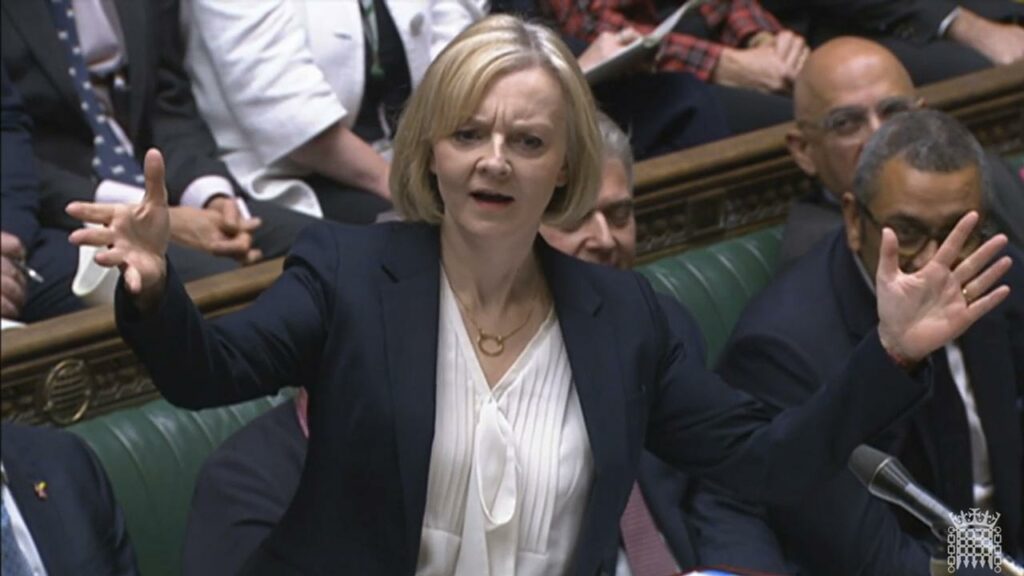Truss clings to power as chaos escalates
Elizabeth Piper and Andrew MacAskill |

Britain’s Liz Truss is battling to retain her grip on power a day after she lost a second top minister and jostling among her lawmakers in parliament highlighted a breakdown of party unity and discipline.
In just six weeks as prime minister, Truss has been forced to abandon almost all her policy program after it triggered a bond market rout and a collapse of her approval ratings and those of her Conservative Party.
Since last Friday she has lost two of the four most senior ministers in government, sat expressionless in parliament as her new finance minister ripped up her economic plans and faced howls of laughter as she tried to defend her record.
“We can’t go on like this,” one Conservative lawmaker told Reuters late on Wednesday, of the chaotic scenes in parliament.
The sight of yet another unpopular prime minister clinging to power underscores just how volatile British politics has become since the 2016 vote to leave the European Union unleashed a battle for the direction of the country.
Truss became Britain’s fourth prime minister in six years after being elected in September to lead the Conservative Party by its members, not the broader electorate, and with support from only around a third of the party’s lawmakers. She promised tax cuts funded by borrowing, deregulation and a sharp shift to the right on cultural and social issues.
Her abrupt loss of authority comes as the economy heads into recession and her new finance minister Jeremy Hunt races to find tens of billions of pounds of spending cuts to reassure investors who took fright at Truss’s policy proposals.
Government borrowing costs, while lower than they were at the height of the crisis last week, remain elevated as investors question who is in charge and whether Hunt will be able to rebuild Britain’s once-sound economic reputation.
Crispin Blunt, a Conservative lawmaker for 25 years, told Reuters the situation was so grave that his colleagues needed to allow one person with experience to take control.
“Personal considerations and ambition now must be set aside,” he said, adding that he would back Hunt as leader.
Tobias Ellwood, head of parliament’s defence select committee, said Truss needed to survive until October 31 when Hunt is due to set out how he will rebuild the public finances.
Any implosion before then, he said, would lead to yet more pressure on the pound.
Other candidates to replace Truss include former finance minister Rishi Sunak – who warned that her economic policy would damage the economy – or Penny Mordaunt, a minister who is popular with many strands of the party.
Truss has been fighting for political survival since September 23 when her then-finance minister and close ally, Kwasi Kwarteng, announced a “mini-budget” of vast, unfunded tax cuts that sent shockwaves through financial markets.
She fired Kwarteng on Friday and accepted the resignation of her interior minister, Suella Braverman, on Wednesday.
With opinion polls showing the Conservatives face a wipeout at the next election, some lawmakers say Truss must go so they can try to rebuild their brand. Others seem to have given up.
With inflation at a 40-year high and mortgage rates jumping, the scenes of lawmakers warring and scheming in parliament risk deepening anger among voters who are preparing for a tough winter of rising food and energy costs.
Wednesday’s parliamentary drama was sparked by confusion over whether a vote on fracking was a confidence vote in the government. Opposition lawmakers said some of Truss’s Conservatives were “manhandled” to vote with the government.
In the turmoil that followed the government could not say for several hours whether the politician in charge of party discipline – the chief whip – had quit.
Truss’s Downing Street office eventually issued a statement to say the prime minister had “full confidence” in the chief whip and her deputy.
Reuters